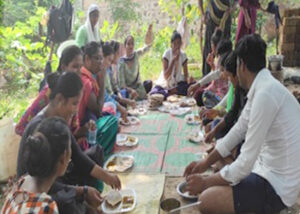Breaking Down Barriers

While India’s caste system may be fading in acceptability and visibility in the cities, in rural settings, it is alive and well. In the villages where EHA runs community programs, many people belong to the Dalit, or untouchable, caste, and those higher up in the social order want nothing to do with them.
The Chhatarpur Christian Hospital (CCH) community project staff have reached out to a group of youths in the village of Bedar. Many of these young people had no goals or dreams for their future. CCH staff formed a boys’ and a girls’ group to go through the Nae Disha program. This curriculum is designed to improve attitudes about mental health, gender equality, and resilience for young people in low-income settings. As the groups progressed through the material, they developed friendships with others of different castes, although some still struggled with negative feelings regarding these distinctions.
As a result of going through this curriculum, both the boys and the girls refused to marry early, even though they were strongly pressured by their parents, and most of them stayed in school. They learned the life skills of planning, making good decisions, time management, communication, and anger control. They each gained important tools to help them make their way in life.
After a year of meeting, a graduation was held for the participants. The entire group gathered to cook and eat together, effectively dissolving their cultural, caste, and gender divisions. During the feast, students from both high and low castes sat at the same table for the first time and enjoyed their celebration.
This important work that EHA is doing to break down social barriers and move toward equality for all is key to the future of India.
